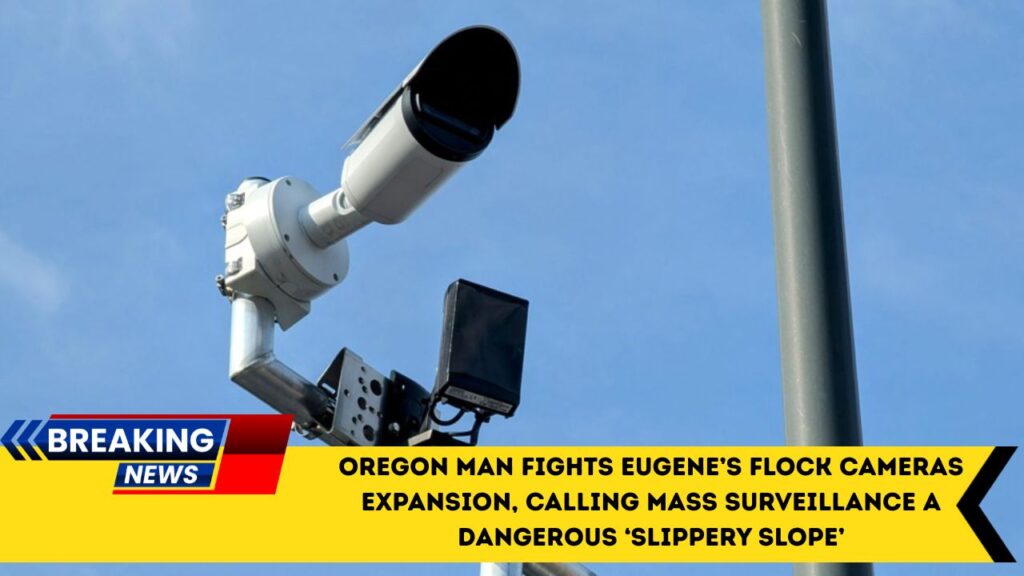A Eugene resident is taking on the city over its growing use of Flock Safety cameras, arguing that automatic licence plate readers are a “slippery slope” toward constant surveillance. \
Backed by a civil-liberties lawsuit, he says the public deserves to know where the cameras are, how data is used, and whether the technology could be turned against vulnerable communities.
As Eugene temporarily pauses parts of its Flock system, the case is now at the centre of Oregon’s privacy debate.
Background: Flock Cameras Spread Across Eugene
In 2025, Eugene and neighbouring Springfield rolled out more than 80 Flock Safety automatic licence plate reader (ALPR) cameras along major roads and key corridors. These devices:
- Use AI to capture licence plates, vehicle make, model and colour.
- Can log every passing vehicle, 24/7.
- Feed data into a central database searchable by police.
Eugene police say the cameras helped in more than 60 cases, including tracking stolen cars and organised retail theft.
But the network is large and largely invisible to the average driver. Estimates put the number of Flock devices in Eugene alone at about 57–60 cameras, with precise locations withheld by the city.
The Lawsuit: Transparency vs. Secrecy
The Oregon man at the centre of the fight, community advocate Seth May, is a member of the anti-surveillance group Eyes Off Eugene. He filed a public-records request in June 2025 asking for:
- The number of Flock cameras in Eugene.
- Their intersection- or block-level locations.
The city denied the request, citing a state law that allows it to withhold records that might reveal “security measures” or weaknesses in those measures. A later appeal to the Lane County district attorney was also denied.
With support from civil-liberties lawyers, May has now sued the City of Eugene in Lane County Circuit Court, arguing that people cannot meaningfully debate or oversee surveillance if they don’t even know where the cameras sit.
Why He Calls It a ‘Slippery Slope’
May and other critics say Flock technology risks turning Eugene into a mass-surveillance zone:
- Every car’s movements can be logged and searched, not just those of suspects.
- Data can be shared through a nationwide network of agencies, far beyond Eugene.
- Future changes in law or political power could allow the data to be used to target immigrants, protesters, abortion seekers or minority communities.
For May, that’s the “slippery slope”: once the infrastructure exists, there is constant pressure to expand its use, store data longer, and plug it into new tools like Flock’s broader “public safety data platform.”
City’s View: A Public Safety Tool
City officials argue the technology is valuable and effective. They say:
- Flock cameras help reduce crimes such as car theft and burglary
- The cameras only collect vehicle-related data, not people’s faces
- Police cannot track drivers without a legitimate investigative reason
- Data is automatically deleted after a set retention period
- Not revealing camera locations prevents vandalism
Despite these assurances, many residents believe the city should provide more transparency.
Flock Cameras in Eugene — Key Facts (2025)
| Category | Detail |
|---|---|
| Estimated cameras in Eugene | 50–60 units |
| Cameras in Eugene–Springfield region | 80+ total |
| Primary purpose | Track stolen vehicles, suspect vehicles |
| Data collected | Plate number, vehicle metadata, time & location |
| Main concern | Lack of transparency & privacy protections |
| Risk highlighted | Mass surveillance “slippery slope” |
Community Reactions
Public opinion is sharply divided:
- Supporters say the cameras make neighborhoods safer and help police respond quickly.
- Opponents believe the system normalizes surveillance and could be expanded without public input.
- Civil-liberties advocates warn that without safeguards, these tools could set a dangerous precedent across Oregon.
Several residents are now calling for clearer rules, community oversight, and public release of general camera locations.
The debate over Flock cameras in Eugene highlights a larger question facing communities nationwide: how far should cities go in adopting new surveillance technologies?
While the system undeniably helps law enforcement, the Oregon resident leading the challenge insists that privacy, transparency and consent must remain non-negotiable.
As the conversation continues, Eugene’s approach could influence how future technologies are adopted across Oregon — and whether residents trust or resist the expansion of digital surveillance in daily life.
